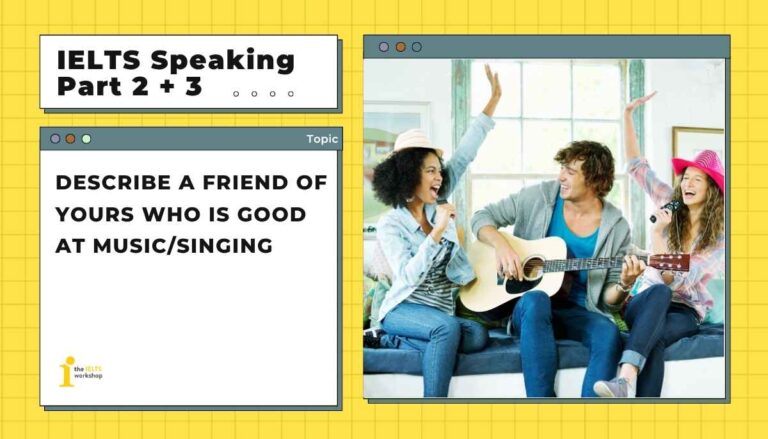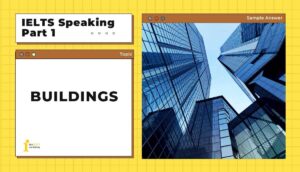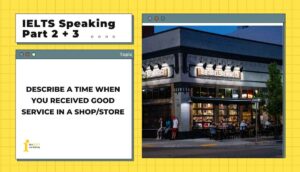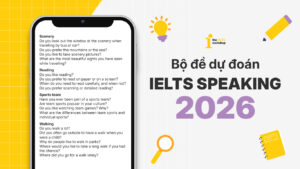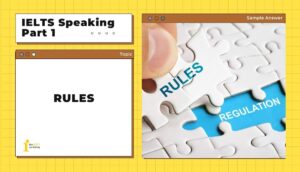Bài mẫu chủ đề “Describe a friend of yours who is good at music/singing” của cô Đinh Thảo Chi cung cấp ý tưởng mạch lạc, từ vựng đa dạng và chiến lược trả lời hiệu quả cho IELTS Speaking Part 2.
Part 2: Describe a friend of yours who is good at music/singing
You should say:
- Who he/she is
- When/where you listen to his/her music/singing
- What kind of music/songs he/she is good at
- And explain how you feel when listening to his music/singing
1. Bài mẫu (Sample)
A friend of mine who’s really talented at drumming is my close friend Minh. He has an excellent sense of rhythm, and honestly, it feels like rhythm just comes naturally to him. Whenever he listens to a song, he can immediately catch the beat and keep the tempo perfectly — it’s almost like he was born with a metronome inside his head. Even when he’s just clapping along, it already sounds musical and precise.
Minh started learning the drums quite early, probably in secondary school, and over the years, he’s become incredibly skilled. Now, he can perform complex drum patterns and technical fills effortlessly. Watching him play is always fascinating — you can see how much he enjoys himself behind the drum kit. There’s something really captivating about watching someone who’s genuinely good at what they do, completely immersed in their passion.
What I like about drumming, and Minh’s style in particular, is how energetic and flexible it feels. Drums can instantly liven up a room, and Minh has that gift — he can make any jam session feel alive. He also teaches others how to play, and his lessons are always filled with laughter. He’s goofy and easy-going, so everyone feels relaxed, and people just joke around and have fun while learning.
Drumming, as Minh often says, is both structured and creative. Once you’ve mastered all the basic rudiments, it becomes more about experimenting with grooves and rhythms — almost like telling a story through beats. That’s what makes it so freeing and expressive. And because Minh’s sense of rhythm is so strong, he’s naturally good at anything involving percussion or timing — even karaoke nights are super fun when he’s around, because he can turn any simple tune into a rhythmic jam.
Sample band 7.0+ by Dinh Thao Chi, IELTS Teacher at The IELTS Workshop
2. Từ vựng (Vocabulary)
- Sense of rhythm: Cảm nhận về nhịp điệu
- Catch the beat: Bắt được nhịp của bài hát
- Keep the tempo: Giữ nhịp ổn định
- Metronome: Máy đếm nhịp (dùng để luyện nhạc cụ)
- Clapping along: Vỗ tay theo nhịp
- Complex drum patterns: Các mẫu trống phức tạp
- Technical fills: Các đoạn kỹ thuật trong bài trống
- Immersed in their passion: Đắm chìm trong đam mê của mình
- Liven up a room: Làm cho không khí sôi động hơn
- Goofy and easy-going: Hài hước và thoải mái
- Rudiments: Các kỹ thuật cơ bản (trong trống)
- Grooves and rhythms: Nhịp điệu và tiết tấu
- Percussion: Bộ gõ (nhạc cụ gõ như trống, cymbal, v.v.)
- Rhythmic jam: Buổi chơi nhạc ngẫu hứng có nhịp điệu
- Fun-loving personality: Tính cách vui vẻ, yêu đời
Xem thêm: Cách học từ vựng IELTS hiệu quả từ thầy Đặng Trần Tùng 9.0
Part 3:
1. What kind of music is popular in your country?
In Vietnam, pop music is probably the most popular, especially songs by local artists that blend catchy melodies with meaningful lyrics. Besides that, indie music has also gained a lot of fans in recent years because people enjoy something authentic and personal rather than overly commercial.
- pop music: nhạc pop
- blend catchy melodies with meaningful lyrics: kết hợp giai điệu bắt tai với ca từ ý nghĩa
- indie music: nhạc độc lập (tự sáng tác, không thuộc hãng thu âm lớn)
- gained a lot of fans: thu hút nhiều người hâm mộ
- authentic and personal: chân thật và mang tính cá nhân
- overly commercial: quá thương mại hóa
2. What kind of music do young people like?
Most young people prefer modern genres like pop, R&B, and EDM because they’re energetic and trendy. Many also listen to K-pop and Western hits, thanks to social media platforms like TikTok and YouTube. Music nowadays is very globalized, so young people in Vietnam often have similar tastes to those in other countries.
- modern genres: các thể loại hiện đại
- K-pop and Western hits: nhạc Hàn Quốc và các bản hit phương Tây
3. What are the differences between young people’s and old people’s preferences in music?
Older people tend to enjoy classic love songs or traditional Vietnamese music, which often have slower rhythms and meaningful lyrics. Young people, on the other hand, are drawn to faster beats and modern sounds. However, I think both groups appreciate music that connects to their emotions and memories.
- classic love songs: những bài hát tình cảm kinh điển
- traditional Vietnamese music: nhạc truyền thống Việt Nam
- slower rhythms: nhịp điệu chậm hơn
- meaningful lyrics: lời bài hát ý nghĩa
- faster beats: tiết tấu nhanh hơn
- modern sounds: âm thanh hiện đại
4. What are the benefits of children learning a musical instrument?
Learning a musical instrument helps children develop concentration, creativity, and discipline. It also teaches them how to express emotions and work collaboratively if they play in a band or orchestra. Besides, it’s a great way to boost confidence because performing in front of others helps children overcome shyness.
- concentration, creativity, and discipline: sự tập trung, sáng tạo và kỷ luật
- express emotions: thể hiện cảm xúc
- work collaboratively: làm việc hợp tác với người khác
- band or orchestra: ban nhạc hoặc dàn nhạc giao hưởng
- boost confidence: tăng sự tự tin
5. Do you know what kind of music children like today?
Nowadays, many children love fun and upbeat songs from cartoons, TikTok, or YouTube videos. Some also enjoy K-pop or pop idols that their siblings listen to. What’s interesting is that children are becoming more digitally connected, so they’re exposed to a wider range of music at a younger age.
- un and upbeat songs: những bài hát vui nhộn và sôi động
- K-pop or pop idols: các thần tượng nhạc pop hoặc K-pop
- more digitally connected: kết nối kỹ thuật số nhiều hơn
6. Do you think the government should invest more money in concerts?
Yes, I do. Investing in concerts can promote local culture, support talented artists, and boost tourism. Live music events also help bring communities together, especially young people who are passionate about the arts. I think the government should create more opportunities for public performances and cultural exchange, not just in big cities but also in smaller provinces.
- promote local culture: quảng bá văn hóa địa phương
- support talented artists: hỗ trợ nghệ sĩ tài năng
- boost tourism: thúc đẩy du lịch
- create more opportunities for public performances and cultural exchange: tạo thêm cơ hội cho biểu diễn công cộng và giao lưu văn hóa
Vocabulary
- Passion and humility: đam mê và khiêm tốn
- Pours her heart into every note: hát bằng cả trái tim
- Lift your mood: làm bạn cảm thấy vui hơn
- Unwind: thư giãn
- Authentic and personal: chân thật và mang tính cá nhân
- Classic love songs: nhạc tình cổ điển
- Develop concentration and creativity: phát triển khả năng tập trung và sáng tạo
- Boost confidence: tăng sự tự tin
- Digitally connected: kết nối kỹ thuật số
- Promote local culture: quảng bá văn hoá địa phương
Xem thêm: 30+ chủ đề từng vựng IELTS thông dụng bạn cần biết
Tạm kết
Hy vọng bài mẫu trên đã giúp bạn hình dung rõ cách triển khai ý tưởng và sử dụng ngôn ngữ phù hợp khi gặp chủ đề Describe a friend of yours who is good at music/singing trong IELTS Speaking Part 2 & 3. Tham khảo các nguồn tài liệu hữu ích như KHO BÀI MẪU IELTS SPEAKING và Bộ đề dự đoán IELTS Speaking cập nhật mới nhất.
HỌC IELTS MIỄN PHÍ – lớp học độc quyền chỉ có trên website của The IELTS Workshop. Đăng ký để bắt đầu lộ trình học bài bản cùng thầy cô tại TIW ngay nhé!


